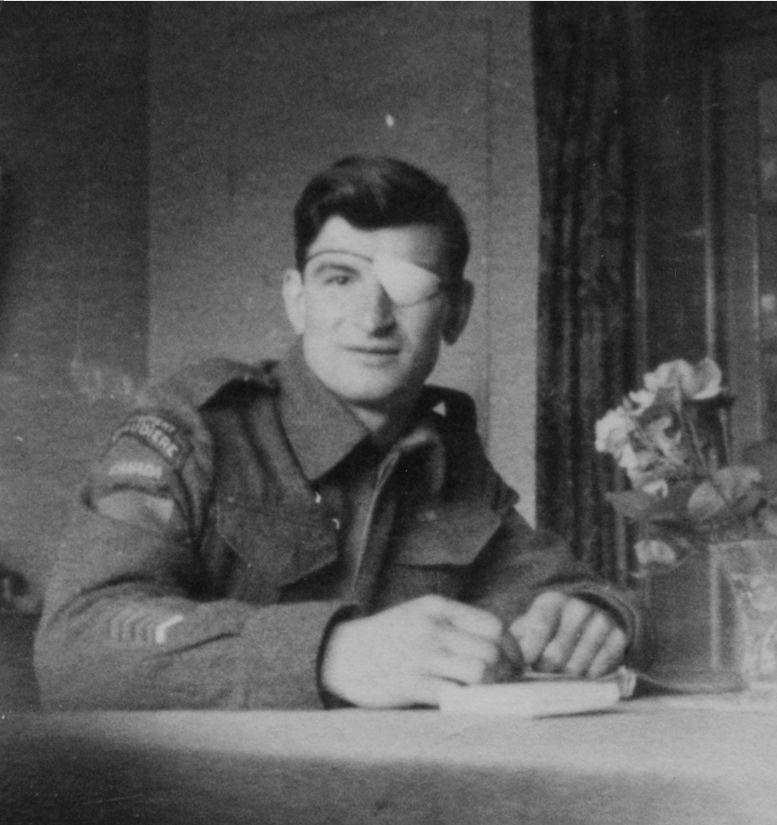The Battle Fronts
By Maj.-Gen. Sir Charles Gwynn, K.C.B., D.S.O.
The War Illustrated, Volume 6, No. 155, Page 770-771, May 28, 1943.
On May 6, 1943, the battle of Tunisia was decisively won by a blitzkrieg attack following on a series of desperate encounters in which the enemy's troops were exhausted and his reserves expended. The enemy had been out-fought, out-generalled, and induced to make the mistakes that no doubt General Alexander hoped he would make.
The world stood amazed when it was realized that withing two and a half weeks after the 8th Army's initial attack on April 19 at Enfidaville, the boasted, impregnable Axis stronghold had been penetrated, and that nothing remained by to mop up the fragments of its defeated garrison. A blow had been struck at German military prestige almost as heavy as it had received at Stalingrad. The confidence of the German nation and its satellites in the competence of the High Command which had thus twice wilfully exposed its armies to disaster must be approaching vanishing point. Will belief in the effectiveness of the elaborate wall of fortifications which fringes the coastline of Europe survive? Will the German people now realize that the amateur armies of the democratic nations are as formidable fighters as the professional soldiers of the Reich, and better equipped?
The storm is still brewing in Russia; and it may break before this article is published. Meanwhile, there seems every possibility that part at least of the German bridgehead in the Kuban may meet the fate of the bridgehead in Tunisia. The notable superiority which the Russian Air Force is steadily gaining over the Luftwaffe may prove as important a factor as the air superiority established by the Allies in Tunisia.
North Africa
No one exphase of the battle of Tunisia to develop with such amazing rapidity. The enemy in his outer defence ring had positions of exceptional natural strength, and these had been artificially improved with the usual German thoroughness. The position did not lack depth, for behind the mountain strongholds there were second lines of defence almost equally strong, in addition to the fortress of Bizerta itself and the inner defences of Tunis and Cape Bon.
With fifteen divisions of picked and experienced troops, Von Arnim had a formidable army with which to conduct a protected defence if he handled it skilfully and economically. Except in the matter of armour and petrol supply there was no immediate prospect that he would run short of munitions or food. Although he could not hope to equal the immense weight of artillery that could be concentrated against him, that is a disadvantage the defence always experiences. On the other hand, in minefields he had a weapon which has proved highly effective in strengthening the power of defence, and he had ample supplies of mines to enable him to develop the use to the utmost.
The chief disadvantage he suffered from was inferiority in the air, owing to the limited number of airfields available for short-range aircraft and to shortage of petrol. There can be no doubt that the supremacy in the air established by the Allies, if not the main cause of the initial breakdown of the enemy's defence, contributed immensely to its rapid and complete collapse. Valuable as had been air cooperation during the initial attacks on the enemy's defences, it was in exploitation of success and in pursuit that air supremacy became the decisive factor.
Credit for victory must primarily be given to the skill and courage of the attacking infantry, which can seldom have been equalled, and to the support given by artillery. It was their efforts which wore down the enemy's defences and opened the way for the decisive exploitation by aircraft and armour which produced such astoundingly rapid results.
It may be long before the full account of the exploits of the fighting troops can be fully recorded, but it can already be seen with what consummate generalship their efforts were directed. It is abundantly clear that the enemy was not merely out-fought and crushed by greater weight of armament, but that he was completely out-generalled.
The sequence of General Alexander's operations is interesting. First came the very quick attack of the 8th Army on the Enfidaville line, which drove the enemy back to his main position. Some surprise was expressed by the critics that the 1st Army did not attack simultaneously. Presumably the reasons were that the 8th Army attack was only a preliminary operation, intended to establish a threat to the enemy's southern flank while the regrouping of Alexander's command was in progress. Faced with a particularly strong position, with its advanced depots probably still insufficiently stocked for a prolonged major effort, the 8th Army had little chance of achieving decisive success. Its main task was to mislead the enemy and to contain a large part of the strength he had available.
The 1st Army with which Alexander meant to make his decisive attack had a considerable distance to advance and a number of enemy strong-points to capture before it had a reasonable chance of effecting a breakthrough. Its initial attacks began two days after the 8th Army attack and in combination with the action of the French towards Pont du Fahs server further to mislead Von Arnim into believing that his southern flank was chiefly threatened. The enemy consequently expended a considerable part of his armour in meeting the 1st Army in the Koursia plain, where the threat to Pont du Fahs was developing.
The 1st Army's drive towards Tebourba was also vigorously opposed, and met with counter-attacks. Therese preliminary attacks, however, made considerable progress, and the taking of Longstop Hill and Jebel Bou Aoukas, combined with the partial encirclement of Pont du Fahs and the 8th Army's attitude, all tended to convince Von Arnim that Alexander's main effort would be made in the south and that, therefore, he had little to fear in the north.
Even when the American 2nd Corps appeared on the northern front, having by a wonderful cross-country march been switched from the extreme right to the extreme left of Alexander's line, it did not excite his suspicions. Possibly underrating the offensive capacity of American troops, he may have thought they had been brought in on what was likely to be a quiet part of the front, and so been all the more convinced that the 1st Army was the immediate danger. Characteristically, and in accordance with German doctrine, he decided to meet that danger by counter-attacking; and it seems probable that he dew on his northern front reserves to provide the striking force he required. With the 8th Army apparently engaged in preparations for renewed attack, it is unlikely that he weakened his force facing it.
During the last week of April Von Arnim delivered his counter-attacks with the greatest ferocity, but they were met with equally fierce resistance and succeeded only in recovering a little lost ground, though this included the recapture of the important key point of Bou Aoukas. By Sunday, May 2, both sides appeared to have fought themselves to exhaustion; but whereas Von Arnim had expended his reserves, Alexander had still strong forces in hand, including those of the 8th Army which was still uncommitted to a major attack. That Alexander switched a considerable part of the 8th Army – the 7th Armoured Division and the 4th Indian Division – to take part in the decisive attack on the 1st Army front, has just been reported.
The enemy having expended his reserves and exhausted his troops in the counter-attacks, Alexander was now in a position to make his decisive onslaught. He may have postponed it for a day or so in hopes that the weather, which for a week had been restricting air operations, would improve. At any rate before it was delivered came the unexpected collapse of the northern front.
The Americans, far from having been given a defensive role, had been attacking with great vigour, magnificently assisted on their left by the French Moroccan Corps. They had made considerable progress and captured important key-points with the support of an ever-increasing weight of artillery fire.
Lacking reserves and under the onslaught of troops that had with experience mad immense strides in tactical efficiency, the defence wilted. Apparently hoping to escape the grave danger of a sudden collapse, withdrawal to the inner Bizerta defences was ordered. The decision entailed the abandonment of the important road junction of Mateur and the possible complete isolation of the Bizerta fortress. But the decision came too late. At the first signs of retreat, the Americans and Moroccans, without hesitation or delay, started in fierce pursuit; and the enemy never succeeded in rallying effectively in spite of the strong defences available. Once again it was proved that the strongest works cannot be held by demoralized troops. The capture of Mateur on May 3 also opened a line of approach to the flank of the Axis troops opposing the 1st Army at Tebourba.
Yet this unexpected success was probably not the signal for the decisive 1st Army attack which was by now almost ready for delivery. Preceded on May 5 by a local attack to recover J. Bou Aoukas, the main attack was delivered on the next day. The infantry assault, preceded by a devastating air and artillery bombardment, broke through the weakened crust of the Axis mountain defences and, as at Alamein, opened a gap for the waiting armour to break through into the open country. Delivered on a narrow front and aimed, not as in previous attacks towards Tebourba or Pont du Fahs, but straight at Tunis through Massicault, it was a blitzkrieg attack in a matter of a few hours disrupted completely the whole German scheme of defence.
But we may ask ourselves, could our infantry have forced the gap for the armour if German reserves had not previously been exhausted and wrongly used? The village of Massicault, which had been prepared for hedgehog defence, fell without resistance. The counter-attacks which Von Arnim had delivered may have caused a few days' delay, but at the sacrifice of ability to offer prolonged resistance. When the crisis came Von Arnim's reserves were either exhausted or in the wrong place.
Perhaps the most astounding feature in the German collapse was the fall of Bizerta, a fortress designed and equipped to stand a long siege. It is evident that it was no part of the German plan to abandon the place in order to concentrate their whole force for a final stand in the Cape Bon peninsula. Every credit must be given to the Americans and French for the speed and vigour with which they pressed home their attack; but it is inconceivable that they could have reached the fortress but for the breakdown of German morale, due very largely to the mistakes made by Von Arnim.
Now that the battle has been won so decisively, we may consider whether after all in the long run it was not to our advantage that the first attempt to seize Tunis and Bizerta failed. It induced Hitler to expend a substantial number of his best troops and to incur immense losses of men, aircraft, and shipping in maintaining them in their dangerous position – and that at a time when all his resources were needed in Russia. The defeat he has suffered is immensely damaging to his prestige, and it has still further undermined belief in German invincibility and military capacity.
Still more important perhaps, the campaign has given the Allied army invaluable experience, and welded it into a magnificent striking force. An easy occupation of Tunisia would have left it far from prepared to undertake the more difficult operations that may be believed to lie ahead.
The six months that have passed since the first landing in Algeria do not therefore represent lost time. As a matter of fact, in any case a considerable part of the time would have been needed to disembark the whole force with its stores, to build up its base establishments, and to complete its organization. Those processes, no doubt, have been expedited under the pressure of the immediate needs of the campaign; and opportunities have been given to correct faults which might not otherwise have been detected. Now the war in Africa is won. A new phase begins.
Previous and next article from The Battle Fronts
Along the Battle Fronts
Readers are asked to remember that the articles on the War by Land, Sea and Air, specially written for THE WAR ILLUSTRATED by our expert contributors, should be read with at least a fortnight's perspe
The Battle Fronts
When I wrote last it was clear that the initiative had passed to the Russians and that the Germans were in danger of a major disaster if they decided to cling to Orel at all costs; the capture of O
Index
Previous article
There's Now a West Point Over Here
Everyone has heard of the United States Military Academy at West Point, New York; since it opened in 1802 it has trained many thousand highly educated and efficient officers for the U.S. Army. This ar
Next article
I Was There! - How Von Arnim Surrendered at Last
Our brigade columns of the Fourth Indian Division were working their way through hilly country in the St. Marie du Zit zone, 28 miles south of Tunis, on May 12 (said an officer of this famous unit), w






